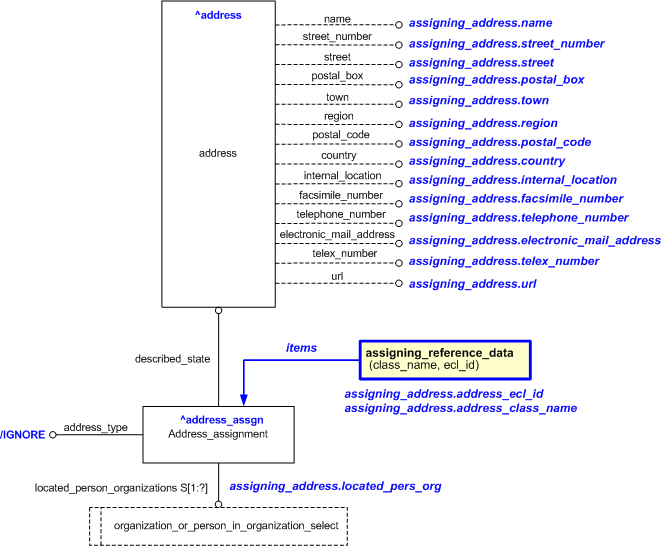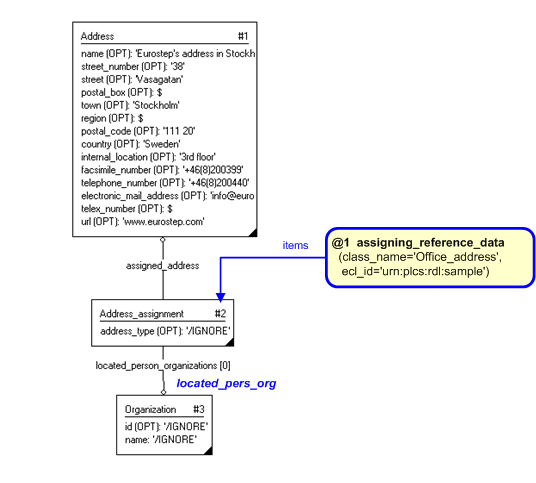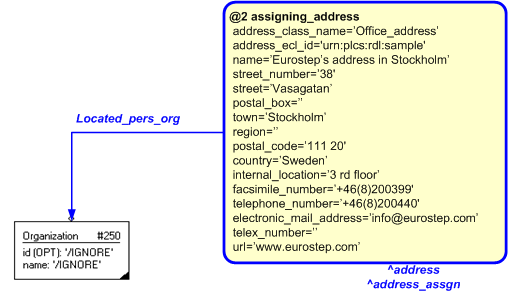Template:— assigning_address (asg_addr)
Capability:representing_person_organization |
Date: 2008/02/20 08:05:00
Revision: 1.12
|
This section specifies the template assigning_address.
NOTE
The template has been defined in the context of the capability
representing_person_organization
which provides an overall description of the
relevant parts of the ISO 10303-239 information model and a description
of related templates.
NOTE
An explanation of a template and the associated instantiation path is
provided in the
Template overview
section.
This template describes how to assign an address to something.
The EXPRESS-G diagram in
Figure
1
shows the templates and EXPRESS entities that are required
to represent the template
"assigning_address".
The text highlighted in blue shows the template parameters.
Figure 1 — An EXPRESS-G representation of the information model for assigning_address
The graphic for the template to be used in other EXPRESS-G diagrams
is shown in Figure
2
below.
Figure 2 —
The graphical representation of assigning_address template
The following input parameters are defined for this template:
The name of the class being used to classify the
address.
This provides the type of address,
for example 'office_address'.
The following classes and their sub-classes can be used:
The identifier of the
External_class_library
storing the definition of the class referenced by the parameter @address_class_name.
name (Type='STRING', Optional)
The name or identifier of the address.
Parameter is optional.
The number of a location on a street.
Parameter is optional.
street (Type='STRING', Optional)
The name of a street.
Parameter is optional.
The number of a postal box.
Parameter is optional.
town (Type='STRING', Optional)
The name of a town.
Parameter is optional.
region (Type='STRING', Optional)
The name or identifier of a region.
Parameter is optional.
The code that is used by the country's postal service.
Parameter is optional.
The name of a country.
Parameter is optional.
An organization-defined address for internal mail delivery.
Parameter is optional.
The number to which facsimiles may be sent.
Parameter is optional.
The number at which telephone calls may be received.
Parameter is optional.
The electronic address to which electronic mail may be sent.
Parameter is optional.
The number where telex messages may be received.
Parameter is optional.
url (Type='STRING', Optional)
The text that specifies the Uniform Resource Locator associated with the address.
Parameter is optional.
The items to which the address is assigned
The following reference parameters are defined for this template:
Allow the
Address
entity instantiated in this path to be referenced when this template is used.
Note: The
Address
entity can be referenced in a template path by:
%^target = $assigning_address.address%
where
target
is the parameter to which the
Address
is bound.
Allow the
Address_assignment
entity instantiated in this path to be referenced when this template is used.
%^target = $assigning_address.address_assgn%
The instantiation path shown below specifies the entities that are to be
instantiated by the template.
A description of templates and the syntax for the instantiation path is
provided in the
Templates Help/Information section.
The following entities are instantiated with attributes as specified:
The instance diagram in Figure
3
shows an example of the EXPRESS entities and templates that are instantiated by the template:
/assigning_address(address_class_name='Office_address', address_ecl_id='urn:plcs:rdl:sample', name='Eurostep's address in Stockholm', street_number='38', street='Vasagatan', postal_box='', town='Stockholm', region='', postal_code='111 20', country='Sweden', internal_location='3rd floor', facsimile_number='+46(8)200399', telephone_number='+46(8)200440', electronic_mail_address='info@eurostep.com', telex_number='', url='www.eurostep.com', located_pers_org='#250')/
(an illustration of the consolidated assigning_address template is shown in
Figure
4 below.)
Figure 3 — Entities instantiated by assigning_address template
The instance diagram in
Figure
4
shows the graphic symbol for the template that is to be
used in other instance diagrams. The example template is:
/assigning_address(address_class_name='Office_address', address_ecl_id='urn:plcs:rdl:sample', name='Eurostep's address in Stockholm', street_number='38', street='Vasagatan', postal_box='', town='Stockholm', region='', postal_code='111 20', country='Sweden', internal_location='3rd floor', facsimile_number='+46(8)200399', telephone_number='+46(8)200440', electronic_mail_address='info@eurostep.com', telex_number='', url='www.eurostep.com', located_pers_org='#250')/
Figure 4 — Instantiation of assigning_address template
The following section details how the
assigning_address
template can be optionally characterized by assigning
other constructs to it. These are characterizations commonly
applied to the template. The ISO 10303-239 EXPRESS model may enable
other assignments to the entities instantiated by the template.
The following characterizations may apply:
Characterization Assigning dated effectivity
NOTE this characterization is optional.
The address of a person or organization may change over time.
This is represented by associating a dated effectivity with the
assignment of an address where the effectivity represents the period in
which the person or organization was at the address.
The dated effectivity is represented by using the template
assigning_dated_effectivity
to assign a start and end-bound date to an
Address_assignment.




